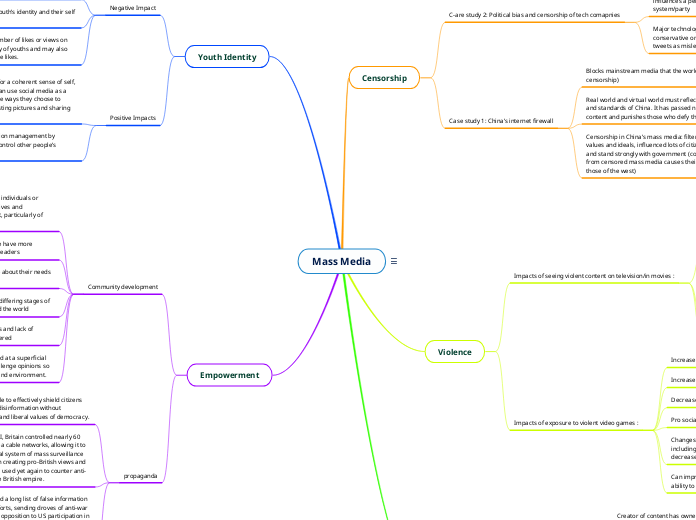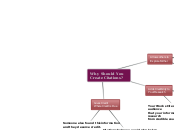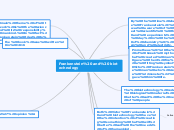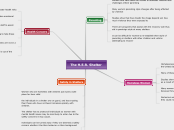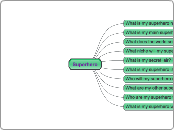Mass Media
Kd
Empowerment
propaganda
The Espionage Act(US) banned a long list of false information deemed harmful to US war efforts, sending droves of anti-war activists to prison for peaceful opposition to US participation in the war. A censorship board was created to filter all communication between the US and foreign countries and to prevent “false” and “demoralizing” statements: propaganda used to eliminate antis and hence helping in US war efforts
“At the outbreak of World War I, Britain controlled nearly 60 percent of the world's undersea cable networks, allowing it to establish the world's first global system of mass surveillance and censorship.”: succeeded in creating pro-British views and after the war, propaganda was used yet again to counter anti-colonial dissent throughout the British empire.
In the digital age, it's impossible to effectively shield citizens from hostile propaganda and disinformation without compromising the egalitarian and liberal values of democracy.
Community development
Lack of media literacy so media is consumed at a superficial level, people do not broaden views and challenge opinions so they have less control over their own lives and environment.
Under representation of some communities and lack of diversity means that some are less empowered
unequal distribution of technology leads to differing stages of empowerment through mass media around the world
Media spreads info, people gain knowledge about their needs and are empowered to fulfil them
Rise of media and civic participation, people have more freedom to speak up and not blindly follow leaders
Empowerment: ‘the process, through which individuals or communities take direct control over their lives and environment’, closely linked to development, particularly of countries.
Youth Identity
Positive Impacts
youth use social media for impression management by attempting to use these media to control other people’s perceptions of who they are
Identity exploration, or the search for a coherent sense of self, takes place online as well. Youths can use social media as a way of self-presentation through the ways they choose to represent themselves online by posting pictures and sharing aspects of their lives.
Negative Impact
The constant comparison of the number of likes or views on social media can also add to anxiety of youths and may also result in constant obsession of these likes.
Cyber bullying also plays a role in youth’s identity and their self esteem.
The idea of the ‘perfect body type’—- youths on social media may scroll through social media and see posts on society’s expectations as to how one should look like and they may judge themselves on the basis of how other people perceives them
Intellectual Property and creation
What can be done to prevent plagiarism? stricter regulation when limiting the use of someone else’s c c content (analyse and detect duplicate texts eg Duplichecker)
What drives plagiarism?
Lack of authorities to monitor citing of materials
plagiarism: created by one person, but the authorship of which is deliberately hidden or attributed to a different person.
line between ownership of original material, duplication, and distribution has been blurred
With the proliferation of digital distribution and duplication made easier through social media, an inherent problem has risen – the theft of intellectual property.
Creator of content has ownership of product
Violence
Impacts of exposure to violent video games :
Can improve some types of spatial-visual skills, basically, ability to extract visual information from a computer screen
Changes in brain function when processing violent images, including dampening of emotional responses to violence and decreases in certain types of executive control
Pro social behavior
Decreased empathy
Increased aggressive cognition
Increased aggressive behavior
Impacts of seeing violent content on television/in movies :
Nightmares (fear of being harmed)
Exposure to media violence can desensitize people to violence in the real world > watching violence in the media becomes enjoyable and does not result in the anxious arousal that would be expected from seeing such imagery
Children
May be more likely to behave in aggressive or harmful ways toward others
May be more fearful of the world around them.
May become less sensitive to the pain and suffering of others.
Censorship
Case study 1: China’s internet firewall
Censorship in China’s mass media: filtered to reflect own values and ideals, influenced lots of citizens to be very patriotic and stand strongly with government (content they consume from censored mass media causes their views to differ from those of the west)
Real world and virtual world must reflect political values, ideals and standards of China. It has passed new laws on acceptable content and punishes those who defy the restrictions
Blocks mainstream media that the world uses (internet censorship)
C-are study 2: Political bias and censorship of tech comapnies
Major technology companies back liberal views over conservative ones (eg Twitter labels President Donald Trump’s tweets as misleading)
Displayed by social media platforms, affect political results (ie elections) as censorship (eg viewpoints they find objectionable) influences a person’s standpoint on a certain government system/party
